Related Research Articles

A play-by-mail game is a game played through postal mail, email, or other digital media. Correspondence chess and Go were among the first PBM games. Diplomacy has been played by mail since 1963, introducing a multi-player aspect to PBM games. Flying Buffalo Inc. pioneered the first commercially available PBM game in 1970. A small number of PBM companies followed in the 1970s, with an explosion of hundreds of startup PBM companies in the 1980s at the peak of PBM gaming popularity, many of them small hobby companies—more than 90 percent of which eventually folded. A number of independent PBM magazines also started in the 1980s, including The Nuts & Bolts of PBM, Gaming Universal, Paper Mayhem and Flagship. These magazines eventually went out of print, replaced in the 21st century by the online PBM journal Suspense and Decision.
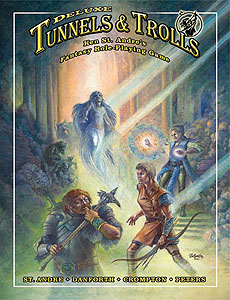
Tunnels & Trolls is a fantasy role-playing game designed by Ken St. Andre and first published in 1975 by Flying Buffalo. The second modern role-playing game published, it was written by Ken St. Andre to be a more accessible alternative to Dungeons & Dragons and is suitable for solitaire, group, and play-by-mail gameplay.

Kenneth Eugene St. Andre is an American fantasy game designer and author, best known for creating the fantasy role-playing game, Tunnels & Trolls (T&T), and the computer role-playing game, Wasteland.

Flying Buffalo Inc. (FBI) is a game company with a line of role playing games, card games, and other gaming materials. The company's founder, Rick Loomis, began game publishing with Nuclear Destruction, a play-by-mail game which started the professional PBM industry in the United States. Loomis added games and players while introducing computer moderation and soon incorporated into the company Flying Buffalo Inc. The company published games in other genres, including card games such as Nuclear War and a role playing game called Tunnels & Trolls, a game similar to Dungeons & Dragons. Flying Buffalo acquired its 10,000th customer account number in 1980 and reached its largest size of 21 employees in 1983.
Starweb is a closed-end, space-based, play-by-mail (PBM) game. First published by Flying Buffalo Inc. in 1975, it was the company's second PBM game after Nuclear Destruction, the game that started the PBM industry in 1970. Players today can choose a postal mail or email format. Fifteen players per game assume one of six available roles and explore and conquer planets within a universe comprising 225 worlds. The object of the game is to attain a predetermined number of points which are generated by various actions during gameplay. Multiple game variants are available. Starweb is still available for play as of 2021 through the company Rick Loomis PBM Games.

Buffalo Castle is a gamebook first published by Flying Buffalo in 1976 (ISBN 0-940244-01-2). Using the Tunnels & Trolls role-playing system, Buffalo Castle consists of 150 paragraphs in A4 format.

Steven S. Crompton is a Canadian-born artist, author and designer who has worked in the role-playing and comic genres since 1981. In the gaming industry he is best known as the artist for the Grimtooth's Traps books as well as other Catalyst role-playing game supplements, Tunnels & Trolls and the Nuclear War card game.

Rick Loomis was an American game designer, most notable as the founder of game publisher Flying Buffalo, which he managed until his death.

Deathtrap Equalizer Dungeon is a 1977 gamebook published by Flying Buffalo.
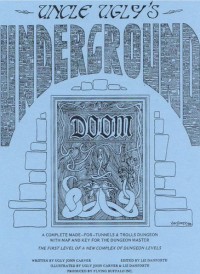
Uncle Ugly's Underground is a 1978 role-playing game adventure for Tunnels & Trolls published by Flying Buffalo. It was written by Ugly John Carver. Although described on the cover as "The first level of a new complex of dungeon levels." to date only Level 1 has been released. A referee is required to play.

Empyrean Challenge is a strategic science fiction play-by-mail (PBM) game. Published by Superior Simulations in 1978, its introduction was important to the nascent PBM industry. 150 players per game strove to dominate a cluster of star systems. Diplomacy, combat, economics, technological development, colonization, and other factors were important aspects of gameplay. Detailed work was required in all aspects of the game, requiring a significant investment in time for players. Reviewer Jim Townsend stated in 1988 that Empyrean Challenge was "the most complex game system on Earth".

Dargon's Dungeon is a 1977 adventure published by Flying Buffalo for Tunnels & Trolls.
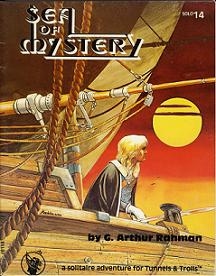
Sea of Mystery is a 1981 role-playing game adventure for Tunnels & Trolls published by Flying Buffalo.

Heroic Fantasy is a computer-moderated, dungeon crawl play-by-mail game. It has been active since 1982 when it was published by Flying Buffalo. The initial edition involved nine dungeon levels. Flying Buffalo published subsequent editions due to challenging gameplay initially, eventually limiting the game to four dungeon levels with a fifth outdoors level where players can assemble an army and capture one or more castles. The game is open-ended; gameplay continues until players decide to stop.

Galactic Conflict is a space-based, computer-moderated, play-by-mail game originally published by Flying Buffalo in 1982. As August 2021, Rick Loomis PBM Games took over as game publisher. During gameplay, six to fifteen players expand across the galaxy, building industrial capacity and pursuing Civilian Projects through various means. Some player diplomacy is typical. The game received multiple reviews in the early 1980s, receiving generally positive comments.

Gaming Universal was a magazine dedicated to play-by-mail games. The magazine was published between 1983 and 1988, in two separate print runs with Bob McLain as editor of both editions. Its first print run was published by Imagascape Industries between November 1983 and 1985. The first issue was called PBM Universal, with a name change by the second issue. The second edition ran between 1987 and 1988, published by Aftershock Publishing. The magazine received average to positive reviews from other magazine editors and reviewers.

Nuclear Destruction is a play-by-mail (PBM) game. It was published by Rick Loomis of Flying Buffalo Inc. in 1970. As the first professional PBM game, it started the commercial PBM industry. Offered by postal mail initially, the game is available by email as well in the 21st century. Active for 53 years, as of October 2021, Rick Loomis PBM Games publishes the game. Players use strategic missiles, factories, money, and other elements of gameplay with a focus on diplomacy to win by becoming the sole survivor.
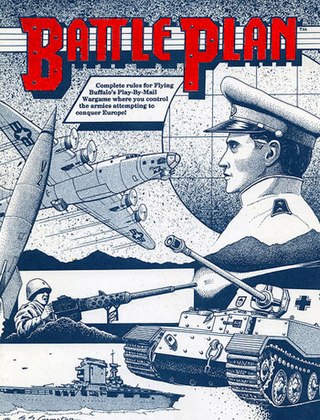
Battle Plan is a closed-end, military strategy, play-by-mail (PBM) wargame. It was first published by Flying Buffalo Inc. in 1972, as one of the company's game offerings after Nuclear Destruction, the game that started the PBM industry in 1970. In August 2021, Rick Loomis PBM Games began publishing the game.
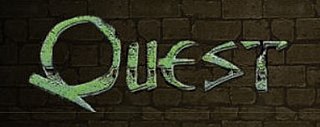
Quest is an open-end, fantasy, play-by-mail (PBM) role-playing game. Initially released in the United Kingdom in 1991, by Adventures by Mail, it later became available for play in the United States, Australia, and other countries in Europe. The game has a First and Second Age, initially comprising about twenty worlds of up to 1,000 parties controlled by players. After the year 2000, the worlds consolidated into four. The current publisher is KJC Games.
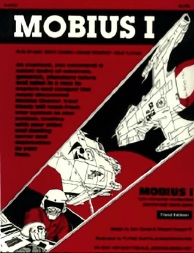
Mobius I is a closed-end, space-based play-by-mail (PBM) wargame of space conquest. The game was first published in 1984 by Mobius Games and was subsequently published by Flying Buffalo, Inc. and Rick Loomis PBM Games.
References
- 1 2 3 Jones, Stefan (March 1981). "Capsule Reviews". The Space Gamer (37). Steve Jackson Games: 28.
- 1 2 Loomis, Rick (April 1982). "Space Battle (Flying Buffalo, Inc.)". The Space Gamer . No. 50. p. 38.
- 1 2 3 4 5 6 Loomis, Rick (February 1979). "Editorial". Flying Buffalo Quarterly. No. 38. p. 2.
- 1 2 3 4 Loomis 1980. p. 6.
- ↑ Loomis, Rick (June 1979). "Editorial". Flying Buffalo Quarterly. No. 39. p. 3.
- 1 2 Lunsford, M.T. (February–March 1988). "Taking Inventory". D2 Report: The Play-by-Mail Gamer's Reading Companion. No. 15. p. 15.